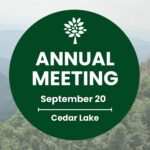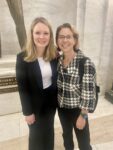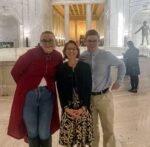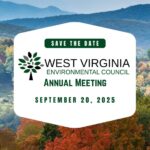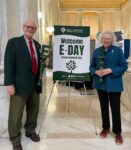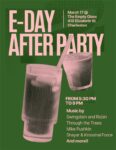No, I won’t back down!
We’re about halfway through the 2017 Legislative session, and like a boxing match, we’re all a little bruised but not defeated!

Thank you to all who turned out for the Public Hearing on HB 2811 on Monday, and to everyone who made phone calls and sent letters. The fight is far from over, but we’re making headway. See more about the Public Hearing and HB 2811 below.
A Step Forward on HB 2811
by Kate Leary
HB 2811, a bill which seeks to exempt tanks associated with oil and gas production from the Aboveground Storage Tank Act, was somewhat improved by a committee substitute offered in the House Judiciary Committee on Monday.
Importantly, under this new version of the bill all tanks would remain registered, meaning that basic information about the tanks will be publicly available, and informative signs will be posted. For both citizens and public water system managers, this information is an important resource for planning and assessment, as testimony from a representative of the Morgantown Utility Board highlighted. Some ambiguity remains in the language but we are hopeful that the House Judiciary members will do the right thing to maintain transparency.
We were disappointed, however, that tanks located within the Zone of Peripheral Concern (ZPC) will still be exempted from substantive requirements of the Act. Thanks to the somewhat arbitrary nature of the guidelines, a tank containing crude oil, brine or condensate located even a second outside the Zone of Critical Concern can be treated entirely differently from those within it.
Thanks to HB 2811, those ZPC tanks would not subject to regulation, and would not even be treated as “tanks” for the purposes of the law. An amendment offered by Delegate Pushkin would have specifically addressed this issue and ensured that the ZPC tanks remain adequately regulated, but unfortunately it was not adopted.
Public Hearing on HB 2811
by Kate Leary
At the public hearing, on Monday, March 13, 2017, citizens expressed their concerns surrounding the bill. Although the participants were about evenly divided between support and opposition to the bill, speakers supporting HB 2811 were almost exclusively employed by the oil and gas industry. By contrast, speakers against the bill included church groups, health organizations, environmentalists, and concerned citizens, reflecting the fact that maintaining a responsible degree of regulation has broad appeal. In fact, some of the speakers were so passionate about ensuring tank safety that they risked running over the allotted time.
Thank you to everyone who stood up and made their opposition heard.
Big Coal’s Big Bill
by Kate Leary
This Saturday, while few people were watching, a 107-page overhaul of environmental and safety regulations related to coal mining was introduced in the Senate.
SB 582 features a number of provisions that are likely to endanger workers, from easing inspection requirements and reducing blast warnings to increasing the potential for diesel emissions within the mine. Some sections of the bill could also pose a threat to the environment more broadly, including a forthcoming reclassification of trout streams and possible changes to water quality guidelines that were omitted from the bill that was available to the public. This omnibus bill has been referred to a subcommittee of Senate Energy Industry and Mining, where it may be split into multiple, more narrowly focused bills.
We are resolved to oppose any changes that negatively impact public health, whether that threat stems from pollution in our streams or an unsafe working environment for miners. We’ll need your help as we dig deeper on this bill, so look out for our upcoming action alerts.
Some Good News
by Kate Leary
Please, call the House Energy committee chair, Delegate Bill Anderson: (304) 340-3168, and ask him to add the bill to the committee’s agenda.
LEEP
by David Manthos
Fortunately, there are some good bills winding their way through the legislative process. Last week HB 2744, the Local Energy Efficiency Partnership Act, passed the House Government Organization Committee and now moves on to House Finance. A Local Energy Efficiency Partnership, or LEEP, provides a framework to incentivize investment in energy efficiency projects, especially for smaller commercial and industrial properties.
With LEEP, a property owner will be able to more easily secure the capital they need to invest in upgrades including (but not limited to) more efficient heating and cooling systems, better insulation, and electric vehicle charging stations.
But with lawmakers sparring over the budget, how can we afford this investment, even if it puts West Virginians to work and saves businesses money? The answer may surprise you.
LEEP is not a subsidy. LEEP is not government grant. LEEP is a legal structure which enables commercial property owners to access capital from a variety of sources, and pay it back out of their energy savings. So where is the money coming from? It could come from a commercial lender, it could come through a grant made to a local unit of government (i.e. the Corporation of Shepherdstown or Kanawha County), or if the local government so desires, they can issue bonds.
This bill doesn’t matter much to Wal-Mart, because they can afford to negotiate directly with an energy efficiency contractor and finance the work at a very favorable rate. But a small warehouse in Wheeling or a retail space in Princeton probably does not have the credit or capital to invest tens of thousands of dollars in energy efficiency improvements that may take years to pay off. This is where LEEP helps.
Whether through a commercial lender, a grant made to a local municipality, bonds, etc., the LEEP framework allows for the loan to be paid back through a special tax assessment on the property. This lien carries the same priority and status as other property taxes, and so the loan is effectively secured through the value of the property and the authority of the local government. The end result is that small business can borrow at a much more favorable rate than they would otherwise be able to through private, unsecured loans or lines of credit.
The LEEP Act is a jobs bill. Energy efficiency improvement work cannot be outsourced, it has to be done right here in West Virginia. Businesses will save money and use less energy; local governments can facilitate improvements in their community and be reimbursed for any costs they incur managing the program.
Please, send a letter to Speaker Armstead, Majority Leader Cowles, Finance Chairman Nelson, and Finance Vice-Chair Householder now and urge their support for HB 2744!
Join The Wilderness Society as they Rally for Public Lands at the Capitol steps (on the River side) at Noon Saturday March 18th!
The New River Gorge National River
Show Senator Manchin, and the 115th Congress, that West Virginians will not stand to see our public lands defunded or destroyed. The more people we have, the stronger a message we send – so please – bring your friends!
Charleston Rally for Public Lands
When: Saturday March 18th, 12:00-1:00pm
Where: Steps of the Capitol Building
Why: To Protect our Public Lands!
RSVP on Facebook here
The 115th Congress continues to attack the very laws that have protected these areas for decades. We need Senator Manchin to take a stand for our public lands. West Virginia’s beautiful spaces depend upon the protections within the Antiquities Act and the Land and Water Conservation Fund.
Join us on Saturday and help us demonstrate our strong support for these bedrock laws!
On behalf of WV Citizen Action Group:
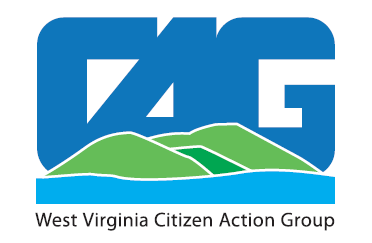
There are FIVE Emergency Town Halls being held this week in West Virginia!
The Congressional Budget Office recently released a report that estimates the new ACA replacement bill would cut health care for 24 million families! Our representatives need to listen to us and stop this dangerous bill!
These events are community-led, open to the public, and Senator Joe Manchin will be in attendance at four events. Join us in expressing our concerns about the ACA repeal.
We’re glad Joe Manchin has finally decided to meet with his constituents, but WHERE IS Senator Capito? Why is she afraid to hear from her own people?
If she won’t come to us, let’s go to her: Come out if you can at 9AM Thursday the 16th to Sen. Capito’s Charleston office to ask her to come out of hiding!
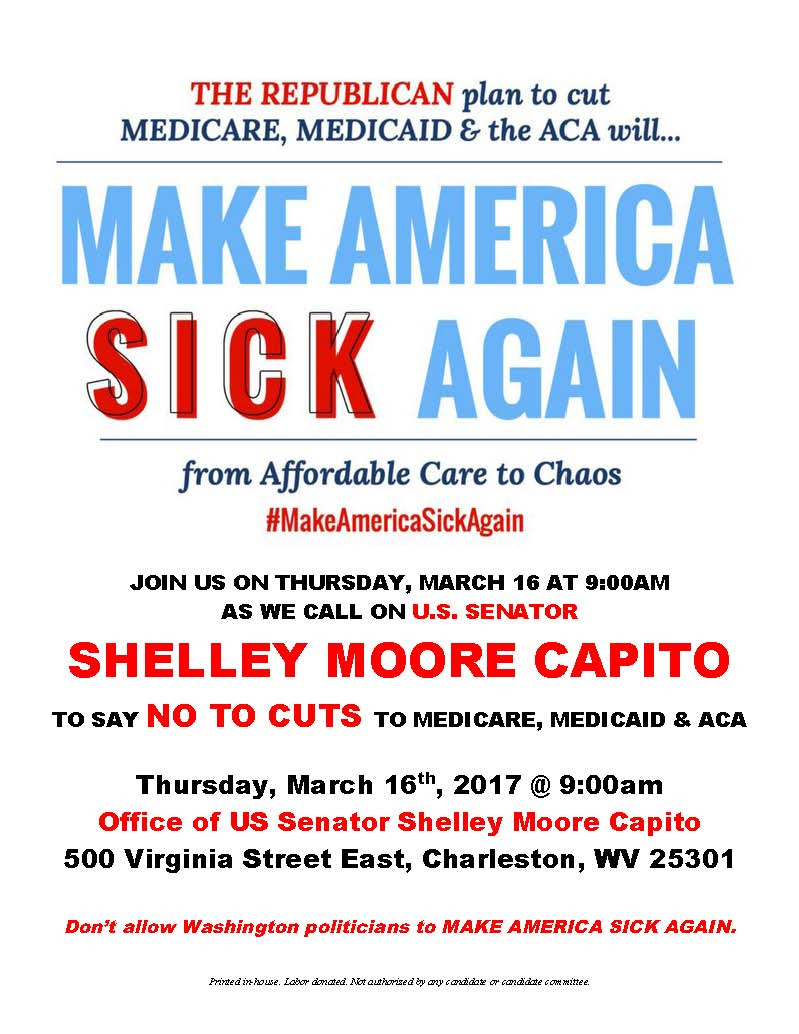
Linked below are the Facebook event pages for the Town Halls, with detailed information and exact locations, so make sure to check in on Facebook and let us know you’ll be there:
Thursday at 11:00am – Martinsburg Health Care Town Hall
– Senator Manchin confirmed; all Congress members invited.
Thursday at 6:00pm – Parkersburg Health Care Town Hall
– Delegation invited, none confirmed.
Thursday at 6:30pm – So. Charleston Town Hall
– Senator Manchin confirmed; all invited.
Friday at 2:00pm – Huntington Health Care Town Hall
– Senator Manchin confirmed; all invited.
Saturday at 3:00pm – Morgantown Health Care Town Hall
– Senator Manchin confirmed; all invited.
On behalf of West Virginia Rivers Coalition:
Contact Your Senators Now on HB 2506
We’re still in a holding pattern as we wait for the West Virginia Senate to take up HB 2506, the bill that would allow more toxins to be discharged in to our water. If you haven’t already, please send you senators a letter asking them to reject HB 2506. Already sent a letter? Ask your friends and family members to get involved!
Looking for some more clarification on how HB 2506 is bad for rivers? The bill proposes to change the way discharge limits are calculated. In essence, through the calculation change, rivers would appear to have much more water flowing through them at their low flows, which would create the potential for a higher amount of toxic discharge. WV Rivers’ science advisor, Evan Hansen, created the chart below to show how changing the calculation would apply to rivers throughout the state.

Find this table and more in our HB 2506 fact sheet.
On behalf of Our Children, Our Future:
Dear Our Children, Our Future Partners and Friends,
One of our platform issues, Second Chance for Employment, has some momentum and we need your help to push it forward even more.
We invite you to participate in the Day of Empathy and Second Chances this Thursday (3/16) starting at 9:00am at the State Capitol. We will be standing together in support of the Governor’s Second Chance for Employment Act which would ease burdens on people with nonviolent felony convictions and help address the cycle of poverty and incarceration. It’s not too late to register!
On the Day of Empathy and Second Chances we are also delivering testimony to House Speaker Tim Armstead. Please bring your own testimony (1-3 sentences will suffice, longer if you prefer) and if there are people you know who are unable to attend on Thursday but whose voices need to be heard, we hope you will bring their testimony with you to deliver to the House Speaker. You can also email it to Lshepherd@afsc.org.
If you cannot make it, make ONE phone call!
Call Senator Trump at (304) 357-7980 and ask him to put SB 366 the Governor’s Second Chance for Employment Act on his Judiciary agenda. Our hope is to move this bill through the Senate first and then have another fight on our hands in the House.
Let’s help get more West Virginians back to work!
Please stay tuned for more updates from under the golden dome. We pledge to continue fighting to protect West Virginia’s water and air quality. We won’t back down. Not today. Not tomorrow. Not ever.




